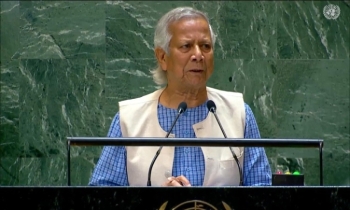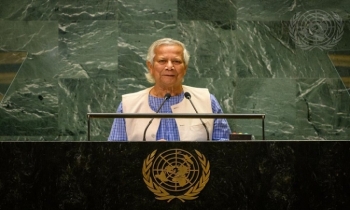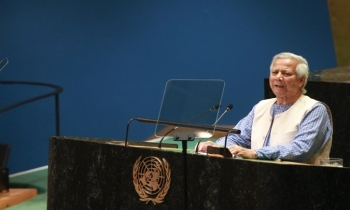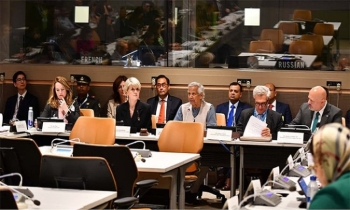Cyclone kills over 10 lashing Bangladesh coastlines
BI Desk || BusinessInsider
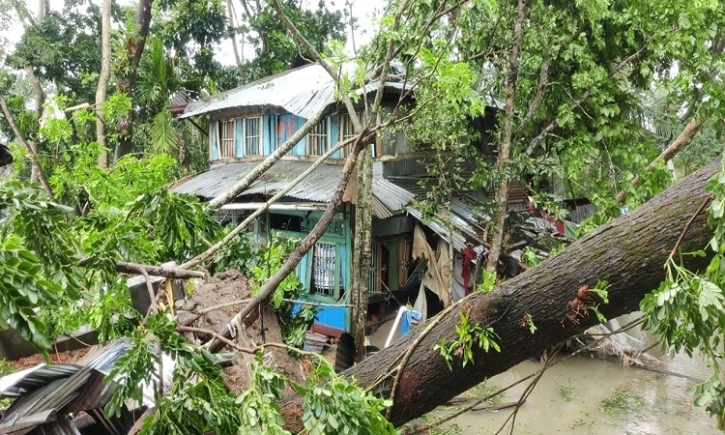
Photo: Collected
A severe cyclone dubbed as “Ramel” lashed Bangladesh coastlines killing 10 people, leveling thousands of homesteads, smashing seawalls and flooding scores of villages and towns along the southwestern shorelines.
State minister for disaster management and relief Mohibbur Rahman said 10 people were killed in the official count so far while the storm entirely damaged over 35 households and affected over 3.75 million people.
Officials in coastal areas said, of the dead some drowned and others were crushed when their houses collapsed, reports BSS.
The cyclone brought with it strong gales and heavy downpours alongside high tides cutting power and road communication lines while officials said many lives were saved as some 800,000 people were moved to cyclone shelters further inside the mainland.
Weather officials said the expansive Sundarbans forest, the world’s largest mangrove vegetation where the three major rivers of the Ganges, Brahmaputra and Meghna meet the sea helped dissipate the worst of the storm.
According to the met office, southwestern Patuakhali was the worst victim of the severe storm where the wind speed rose up to 111 kilometers per hour with tidal surges accompanying the storm flooded and ravaged huge infrastructure including thatched houses.
“The crashing waves virtually washed away everything as it proceeded through the area, particularly Khepupara . . . it became extremely fierce for over half an hour from 1.30 am after the midnight,” a cyclone control room official in Patuakhali said by phone.
The cyclone-driven surges breached a major town protection embankment on the country’s Manpura Island inundating the most parts of the island.
Power ministry officials said they shut down electricity supply to some areas in advance to avoid accidents, while in several coastal areas fallen trees and snapped electricity lines further disrupted supply.
They said nearly three million people in Bangladesh were without electricity while power supply disruptions affected the capital Dhaka as well while residents said their cell phone services too were inoperative as the devices could not be recharged. With the improvement of the situation, the authorities have started restoring the power transmission and distribution system gradually after necessary checking, said Bangladesh Rural Electrification Board (BREB).
According to the Ministry of Disaster Management and Relief, over 3,758,096 people were affected and 35,483 houses were destroyed in 19 districts-Khulna, Satkhira, Bagherhat, Jhalokathi, Barishal, Patuakhali, Pirojpur, Barguna, Bhola, Feni, Cox’s Bazar, Chattogram, Noakhali, Lakhipur, Chandpur, Narail, Gopalganj, Shariatpur and Jashore.
Around 10,000 mobile towers or base transceiver stations (BTS) went out of service due to power supply disruption, hampering mobile and internet services in the southern districts.
The capital Dhaka witnessed heavy rainfall since morning creating water logging in different parts that mounted suffering of the city dwellers, especially the officer-goers, as the CNG-driven auto-rickshaws and rickshaw-pullers charged extra fares.
The weather office said after ravaging the southwestern coastlines, the “severe cyclone” weakened into storm but continued to cause heavy downpours in most parts of Bangladesh including the capital Dhaka which also suffered from electricity disruptions.
“It (cyclone) is likely to move northeastwards further and weaken into a land depression by giving precipitation,” the latest met office bulletin said adding fishing boats to stay in safe shelters until Tuesday.
Ramel hit Bangladesh coasts after 8 o’clock in the evening packing speeds of up to 135 kilometre per hour, hitting the southern Mongla seaport and the adjoining Sagar Islands in India's West Bengal late on Sunday before weakening on Monday morning
A journalist in Patuakhali said the residents expected the cyclone to last for few hours but Ramel lasted for hours instilling into people a deep fear.
Remal was the first cyclone in the Bay of Bengal ahead of this year’s monsoon season, which runs from June to September.



